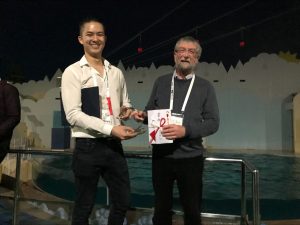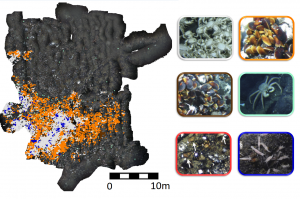Jin Wei Lim, a Leverhulme Trust PhD student in the Faculty of Engineering and the Environment at the University of Southampton has been awarded first place in the OCEANS’18 MTS/IEEE conference help at the Kobe Convention Center in Japan. This year’s competition had more than 100 entries from around the world. The best fifteen entries were chosen to present their posters to a panel of 11 judges, with the best three posters being awarded prizes at a ceremony held during the conference gala dinner.

The winning poster, entitled ‘Automated Interpretation of Seafloor Visual Maps Obtained using Underwater Robots’ demonstrates the feasibility of using Convolutional Neural Networks (CNNs) to automatically interpret large visual maps of the seafloor in volcanically active regions. These regions are often densely populated by deep-sea biological communities and the ability to efficiently document the diversity and distribution of different species over large spatial scales is critical for monitoring the environmental in the context of deep-sea mining. The study shows how the manual process of identifying and annotating individual animals can be automated given a sufficient number of labelled examples. The study further demonstrates how the classification uncertainty of the automated algorithm relates to the number of training examples used for different species of animal, giving important insights regarding how human efforts can be optimized and best leveraged by machines.

Jin Wei commented “This conference has been an eye opening experience. I am really honoured to be able to share my work on this prestigious program, and meet many amazing industry professionals and researchers from all around the globe.”
The research was carried out by Jin Wei as part of his undergraduate final year individual project with the Fluid Structure Interactions group. Jin Wei is currently looking at characterising uncertainty in automated data processing techniques used in ocean research under the supervision of Dr Blair Thornton, Prof Adam Prugel-Bennet and Prof Damon Teagle.
